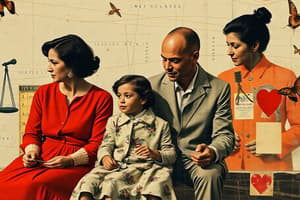Podcast
Questions and Answers
Which of the following best describes the family's role in society?
Which of the following best describes the family's role in society?
- A passive entity without influence
- Irrelevant to the dynamics of society
- A basic social unit and an agent of socialization (correct)
- The only institution affecting child behavior
Family diversity is not a subject of debate within the field of sociology.
Family diversity is not a subject of debate within the field of sociology.
False (B)
What factors can influence changing family policies?
What factors can influence changing family policies?
Gender, sexuality, immigration, childhood, ethnicity, race, class, and economy.
The family is a crucial unit of society that serves as an agent of __________.
The family is a crucial unit of society that serves as an agent of __________.
What is the primary function of emotional support between two adults in a family, according to Parsons?
What is the primary function of emotional support between two adults in a family, according to Parsons?
According to Marxism, the institution of family has remained unchanged through history.
According to Marxism, the institution of family has remained unchanged through history.
What led to the development of the monogamous nuclear family, according to Engels?
What led to the development of the monogamous nuclear family, according to Engels?
Marxist researchers aim to identify _____ within the family and link them to broader economic relations in society.
Marxist researchers aim to identify _____ within the family and link them to broader economic relations in society.
Match the theorist to their view on family:
Match the theorist to their view on family:
Which of the following does NOT represent a change in family structure due to industrialization?
Which of the following does NOT represent a change in family structure due to industrialization?
Universalistic values promote individualism and equality within families.
Universalistic values promote individualism and equality within families.
How did industrialization affect family structures?
How did industrialization affect family structures?
What has Queer Theory added to feminist theories?
What has Queer Theory added to feminist theories?
Postmodernism suggests that societies have moved beyond modernity.
Postmodernism suggests that societies have moved beyond modernity.
What is the concept of 'monolithic bias' as mentioned by Margaret Eichler?
What is the concept of 'monolithic bias' as mentioned by Margaret Eichler?
Theories often treated families as _____ units, overlooking their diverse experiences.
Theories often treated families as _____ units, overlooking their diverse experiences.
Match each bias with its description:
Match each bias with its description:
Which of the following statements is true regarding family definitions?
Which of the following statements is true regarding family definitions?
The traditional family structure is considered to have only one dominant type.
The traditional family structure is considered to have only one dominant type.
What factors contribute to the dynamic nature of the family as a social institution?
What factors contribute to the dynamic nature of the family as a social institution?
What does Murdock define as the essential characteristics of a family?
What does Murdock define as the essential characteristics of a family?
According to Talcott Parsons, what is the impact of industrialization on family units?
According to Talcott Parsons, what is the impact of industrialization on family units?
What are the two 'basic and irreducible functions' of the family identified by Parsons?
What are the two 'basic and irreducible functions' of the family identified by Parsons?
What is 'internalization of culture' in the context of primary socialization according to Parsons?
What is 'internalization of culture' in the context of primary socialization according to Parsons?
What does 'structuring of personality' involve in Parsons' view of socialization?
What does 'structuring of personality' involve in Parsons' view of socialization?
Which statement accurately reflects Parsons' conclusion about family structures in modern societies?
Which statement accurately reflects Parsons' conclusion about family structures in modern societies?
What does 'stabilization of adult personalities' refer to in Parsons' theory?
What does 'stabilization of adult personalities' refer to in Parsons' theory?
In Parsons' theory, which aspect is NOT involved in the primary socialization process?
In Parsons' theory, which aspect is NOT involved in the primary socialization process?
What key role does the family play in the capitalist system, according to Eli Zaretsky?
What key role does the family play in the capitalist system, according to Eli Zaretsky?
According to symbolic interactionism, what is primarily shaped through daily interactions?
According to symbolic interactionism, what is primarily shaped through daily interactions?
Which of the following activities is considered significant for perpetuating family bonds, according to symbolic interactionists?
Which of the following activities is considered significant for perpetuating family bonds, according to symbolic interactionists?
What do symbolic interactionists primarily focus on when studying family dynamics?
What do symbolic interactionists primarily focus on when studying family dynamics?
How does Zaretsky view the relationship between the family and consumption in capitalist society?
How does Zaretsky view the relationship between the family and consumption in capitalist society?
How did the concept of ascribed status change with industrialization?
How did the concept of ascribed status change with industrialization?
What view did Marxism adopt regarding social change?
What view did Marxism adopt regarding social change?
What aspect of family relations did Engels link to the evolution of private property?
What aspect of family relations did Engels link to the evolution of private property?
What did Parsons emphasize about the family's role in providing emotional support?
What did Parsons emphasize about the family's role in providing emotional support?
How did Marxist theorists view the familial structure compared to broader societal structures?
How did Marxist theorists view the familial structure compared to broader societal structures?
In the context of family evolution, what did Engels observe about earlier human relations?
In the context of family evolution, what did Engels observe about earlier human relations?
Which of the following values reflects a shift from traditional family structures due to industrialization?
Which of the following values reflects a shift from traditional family structures due to industrialization?
What is a significant characteristic of the isolated nuclear unit highlighted by Parsons?
What is a significant characteristic of the isolated nuclear unit highlighted by Parsons?
Which bias emphasizes the romanticized view of the nuclear family while disregarding recent changes?
Which bias emphasizes the romanticized view of the nuclear family while disregarding recent changes?
What does postmodernism suggest regarding societal structures and family types?
What does postmodernism suggest regarding societal structures and family types?
Which of the following biases tends to ignore family structures of culturally or ethnically non-dominant groups?
Which of the following biases tends to ignore family structures of culturally or ethnically non-dominant groups?
Which statement about traditional family theorizing is most accurate?
Which statement about traditional family theorizing is most accurate?
Which bias is characterized by treating families as isolated units, detached from societal influences?
Which bias is characterized by treating families as isolated units, detached from societal influences?
What does Queer Theory introduce to feminist frameworks regarding family?
What does Queer Theory introduce to feminist frameworks regarding family?
Which of the following accurately reflects a change in modern theories of family?
Which of the following accurately reflects a change in modern theories of family?
What is an example of 'ageist bias' as described in the content?
What is an example of 'ageist bias' as described in the content?
What is a primary focus of researchers using Exchange Theory in family dynamics?
What is a primary focus of researchers using Exchange Theory in family dynamics?
Which aspect of Family Systems Theory emphasizes the importance of context in understanding individual behavior?
Which aspect of Family Systems Theory emphasizes the importance of context in understanding individual behavior?
Which of the following is a unique characteristic of Developmental Theories regarding family life?
Which of the following is a unique characteristic of Developmental Theories regarding family life?
What assumption do Feminist Theories challenge regarding family structures?
What assumption do Feminist Theories challenge regarding family structures?
Which theorists are mainly associated with Developmental Theories in family studies?
Which theorists are mainly associated with Developmental Theories in family studies?
What aspect does Exchange Theory emphasize in the sustainability of relationships?
What aspect does Exchange Theory emphasize in the sustainability of relationships?
How do researchers using Family Systems Theory view the family?
How do researchers using Family Systems Theory view the family?
What is a common criticism of Exchange Theory in the context of family relationships?
What is a common criticism of Exchange Theory in the context of family relationships?
Which of the following stages is NOT part of the Developmental Theories' family life cycle?
Which of the following stages is NOT part of the Developmental Theories' family life cycle?
In the context of feminist theories, what is a likely focus of research?
In the context of feminist theories, what is a likely focus of research?
Flashcards are hidden until you start studying
Study Notes
Theoretical Perspectives on Family
- Queer Theory integrates sexual orientation into feminist discussions, broadening the analysis of family structures.
- Postmodernism suggests society has evolved past modernity, with individuals acting as both consumers and producers of culture.
- Technology plays a significant role in shaping personal narratives, leading to diverse family types and choices.
Biases in Traditional Family Theorizing
- Traditional theories view the family as an isolated unit, neglecting internal dynamics and gender disparities.
- Assumptions highlighted by Margaret Eichler:
- Monolithic bias: Uniformity in family experiences, ignoring diversity.
- Conservative bias: Romanticizes the nuclear family and dismisses changes as temporary.
- Ageist bias: Excludes children and elderly individuals from family discussions.
- Sexist bias: Engenders beliefs of a "natural" division of gender roles.
- Micro-structural bias: Treats families overly simplistically as isolated entities.
- Racist bias: Discount or devalue families from non-dominant cultures.
- Heterosexist bias: Assumes heterosexual families are the norm, marginalizing LGBTQ+ families.
Evolving Definitions of Family
- Family is a universal yet diverse social institution, continuously redefined by social attitudes, economic trends, and legal frameworks.
- Ongoing research on family sustainability is vital as family structures remain dynamic amid societal shifts.
Importance of Studying Families in Sociology
- Sociology investigates human interactions within groups, with family being a fundamental social unit.
- Family influences individual behavior and is the primary source of socialization.
- Dynamic nature of society leads to evolving conceptualizations of family, making it a rich area for study.
- Changes in family structures prompt discussions about universality and diversity.
Factors Influencing Family Structures
- Societal transformations affect family policies concerning gender, sexuality, immigration, ethnicity, and economic status.
- Emotional support within families helps manage everyday stress, vital in modern isolated nuclear units.
Marxist Perspective on Family
- Karl Marx and Friedrich Engels argue that history and modes of production shape family structures and relationships.
- Social change is viewed as essential and justified from a Marxist stance.
- Marxist research goals include:
- Identifying intra-family power dynamics.
- Connecting family power relations to larger economic trends.
Engels' View on Family Evolution
- Engels proposed that early human societies had communal ownership and no formal family structures, living in promiscuity.
- The institution of monogamous nuclear families emerged with private property and inheritance concerns.
- Men's need for control over women's lineage solidified monogamous relationships to secure legitimate heirs.
Defining Family
- Family is a social group with common residence, economic cooperation, and reproduction.
- Adult members maintain socially approved sexual relationships and provide care for one or more children.
- Murdock regards the nuclear family as the universal family type.
Talcott Parsons and Family Structures
- Industrialization disrupted extended family units, leading to isolated nuclear families.
- Isolated nuclear units are the predominant family arrangement in modern industrial societies.
- Family retains two essential functions despite industrial changes:
- Primary Socialization: Process through which children learn society's culture.
- Maintenance and Stabilization of Adult Personalities: Emotional support between adults to manage stress.
Primary Socialization
- Involves internalization of culture, where children absorb societal values.
- Structuring of personality aligns children’s personalities with societal values.
Stability in Adult Relationships
- Emotional support between adults is crucial for managing stress in isolated nuclear units.
- Industrialization shifts emphasized geographical and social mobility, changing family dynamics.
Marxist Perspective on Family
- Karl Marx and Friedrich Engels focused on family evolution influenced by economic systems.
- Early family structures were communal; with private property, monogamous nuclear families emerged to ensure inheritance legitimacy.
- Eli Zaretsky argues that family masks economic realities, serving to reproduce the workforce and act as a consumption unit.
Symbolic Interactionism
- George Herbert Mead highlights daily interactions within families construct societal meanings.
- Family interactions influence larger societal organizations and shape individual experiences through shared symbols.
Exchange Theory
- Proposed by George Homans and Peter Blau, emphasizing relationships are maintained through a balance of rewards and costs.
- Relationships suffer when there is a perceived imbalance in contributions.
- Focus on inequalities and distribution of resources within marriages and family life.
Family Systems Theory
- Views families as closed systems of social interactions with distinct rules and roles.
- Individual behaviors are best understood within the context of family dynamics and interactions.
Developmental Theories
- Focused on stages in the family life cycle from marriage to aging.
- Recognizes developmental tasks for families and stresses the need for support services during critical development periods.
Feminist Theories
- Emerged in the 1960s, challenging traditional family roles and gender neutral assumptions.
- Variants include liberal, Marxist, and radical feminisms, addressing historical socio-cultural influences on gender relations.
- Queer Theory included discussions of sexual orientation alongside feminist issues.
Postmodernism
- Societies have transcended modernity; individuals actively participate in shaping family structures.
- Emphasis on multiple family types and choices, facilitated by technology’s influence.
Biases in Traditional Approaches
- Theories often treat families as isolated units, overlooking gender differences and power dynamics.
- Margaret Eichler identifies biases like monolithic, conservative, ageist, sexist, micro-structural, racist, and heterosexist assumptions in family studies.
Concluding Thoughts
- Family is both a universal and diverse institution, reflecting changing social values.
- Current definitions of family continue to evolve, highlighting the need for ongoing research and understanding of family dynamics globally.
Studying That Suits You
Use AI to generate personalized quizzes and flashcards to suit your learning preferences.




